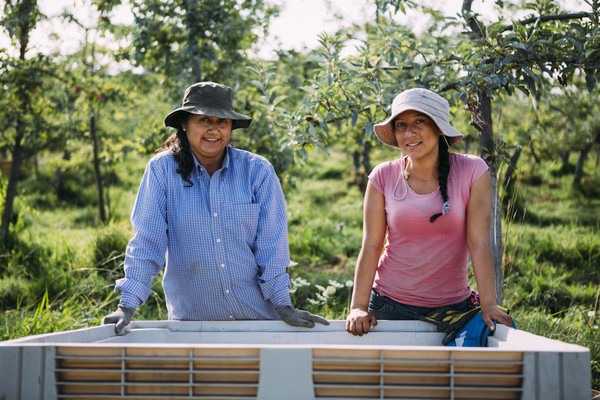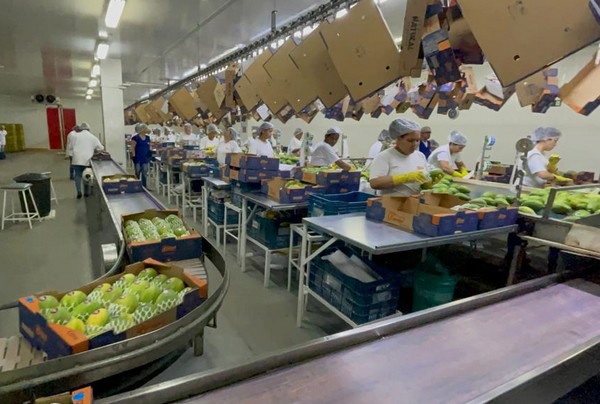South America is an important supplier of produce to the North American continent and there used to be plenty of shipping options by vessel available. However, more recently shipping lines have reduced the number of direct shipments.
“We are seeing a big decline in service,” says Luis Acuña, President of Viva Tierra Organic. The company mainly imports organic apples and organic pears from Chile and Argentina. “Most produce that is being shipped from South America to the US needs to transload in Central America now. “This decline in service from shipping lines has a big impact on our business,” Acuña mentioned.
Containers often miss their connection, resulting in increased transit times, delays, and lower product quality upon arrival. Transloading increases the room for error. Ironically, while the level of service has declined, the costs of shipping have gone up 100% on most routes.
Growers seem to be hit the worst when it comes to price increases. Their input costs like fertilizer, fuel, labor have gone up significantly. In addition, each load of ocean freight impacts the grower’s net return. To make the situation a bit more bearable for growers, Viva Tierra has been taking smaller margins.
“We have a commercial relationship with these growers, and they are asking us to help, to improve their situation,” said Acuña. “Many of these growers we have been working with for years and they are small family farms, not large corporations. They are trying to stay in the game because it is their passion and their families have been involved in growing fruit for several decades. However, it is becoming increasingly tough to survive.”
Viva Tierra’s Chris Ford adds that the company has a unique business model. It follows the seasons in a commitment to delivering the best in-season piece of fruit. “As a result, we not only source close to home, but bring in fruit from other regions, which comes with added cost.”
 Source: Viva Tierra
Source: Viva Tierra
Will consumers keep an appetite for tropicals?
Andres Ocampo, CEO of HLB Specialties, is facing the same challenges. His company imports tropical and exotic fruits like papaya, rambutan, dragon fruit, and more. “Shipping rates from Central and South America to North America have pretty much doubled in the past three years,” Ocampo said.
All price increases together result in the risk of tropicals and exotics becoming too expensive for the consumer. “There is only so much of these additional costs we can pass on to the consumer before they lose their appetite for tropicals,” he commented. “This inflation, in combination with the risk of a recession, is creating an uncertain environment for us. Our items simply aren’t first in line of purchase for the consumer.”
Nevertheless, Ocampo is grateful for the increase in sales his company has seen since the onset of the pandemic. “Thanks to the bold choices of our retail customers and consumer interest, we have been able to make once-unknown exotic fruits into a strong presence in the North American retail landscape."
HLB Specialties markets their products in both North America and Europe. “Demand in Europe is already starting to weaken,” shared Ocampo. As a result, Latin American growers are shifting their focus from Europe to North America. “Not only does North America’s economy seem to be steadier, the strength of the dollar also works in the growers’ favor.” With the US dollar being so strong, it is more appealing to send product to North America.
 Source: HLB Specialties.
Source: HLB Specialties.
One-way traffic
Chris Ford with Viva Tierra Organic is concerned the excessive shipping rates will be a permanent increase. “I don’t have confidence rates will drop,” he said. So far, it is a one-way street with shipping lines increasing their rates without having any conversations with the shippers. “It’s an opportunity they take advantage of,” added Ocampo. “Everyone is dealing with thin margins and struggling to survive. At what cost do these shipping lines want to continue making those extreme profits?”
 For more information:
For more information:
Viva Tierra Organic
Luis Acuña
Luis@vivatierra.com
Chris Ford
Tel: 831-917-7321
chris@vivatierra.com
www.vivatierra.com
 HLB Specialties
HLB Specialties
Andres Ocampo
Tel: (+1) 954-475-8808
andres@hlbspec.com
www.hlbspecialties.com
